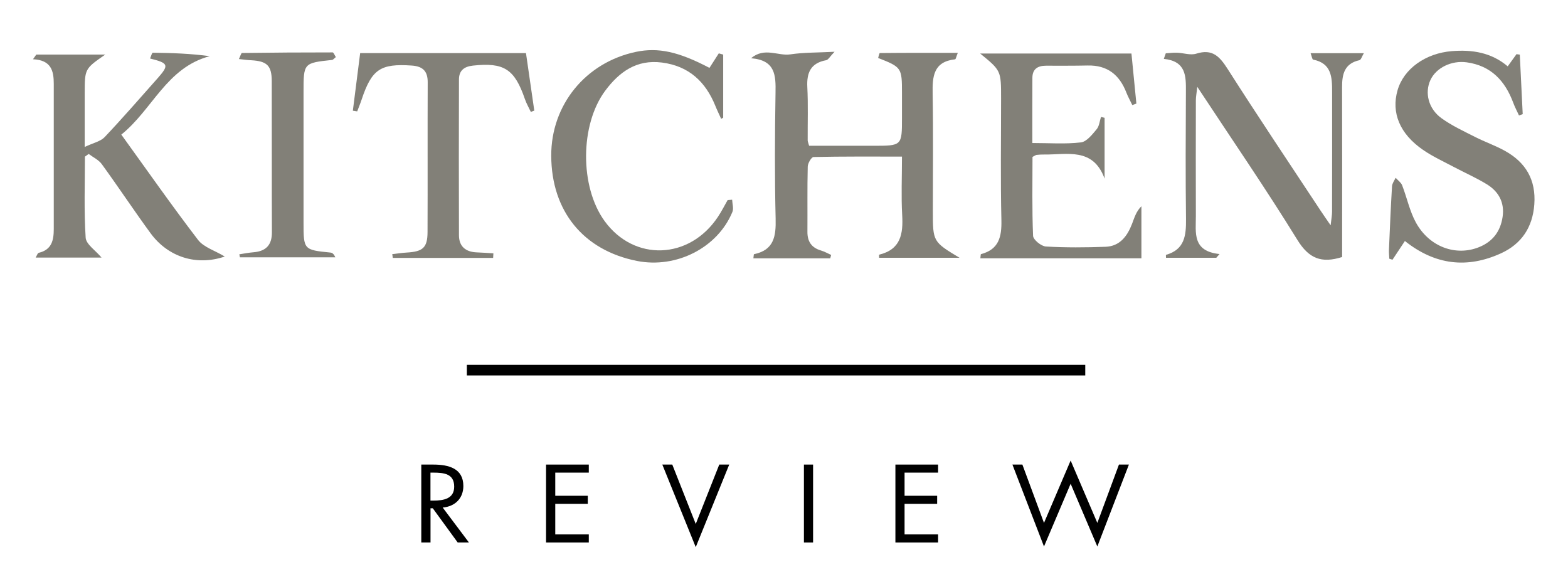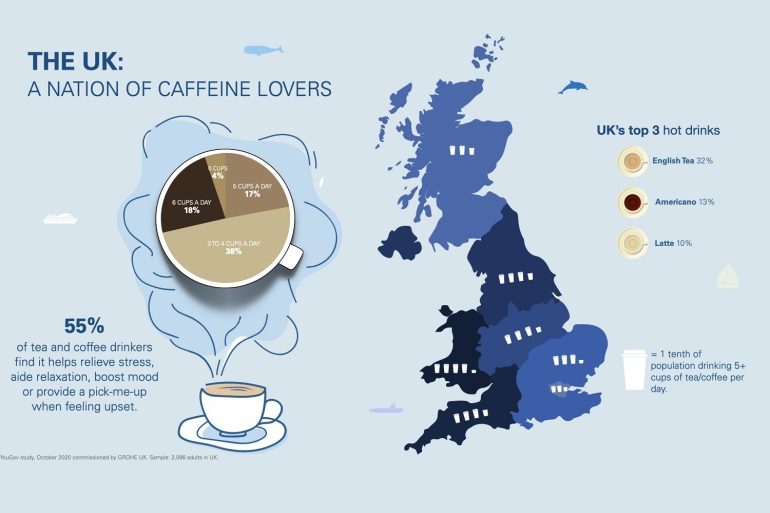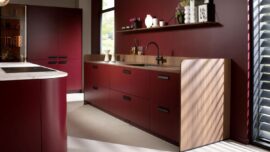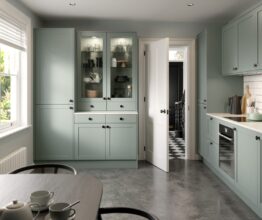You’re not alone – half the nation does. Kitchen and bathroom brand GROHE sheds light on Britain’s views on water quality, single-use plastic consumption and the extent of our caffeine-loving nation in new YouGov study.
What the study reveals:
• 1 in 5 are concerned about water quality
• 68% of people are now committed to not buying plastic bottles at the supermarket in an average week
• 49% of people are keen to avoid single-use plastic but find it difficult to do so
• 18-24-year-olds are paving the way for a more sustainable future, with a third actively avoiding purchasing single-use plastic
• Almost 3 in 10 people (29%) have increased their tea and coffee intake since lockdown
• 55% of tea and coffee drinkers find it helps relieve stress, aide relaxation, boost mood or provide a pick-me-up when feeling upset
• North East and Wales are the UK’s biggest tea and coffee drinkers
The pandemic and its ongoing challenges has plagued every aspect of our lives this year and seen us adopt new habits and behaviours.
The YouGov study was commissioned by GROHE in October 2020 and has highlighted concerns around water quality, the nation’s favourite hot drinks and how essential they are to preserve our wellbeing, The survey also looked at the changing attitudes we have to another global crisis – plastic.
1 in 5 are concerned about water quality
The UK‘s water quality is arguably one of the best in the world but the impact hard water can have on taste – with suspicions of late around microplastics – have cast aspersions for many. 1 in 5 (20%) Brits have some or significant concerns about water quality. Unsurprisingly this is felt most strongly in regions with hard water, with London seeing the highest rates of concern at 26%. More than 1 in 4 (31%) of us are already using some form of water filtration system at home – from jugs to built-in systems in our taps or refrigerators – which suggests we value the benefits, convenience and reassurance of having filtered water at our disposal, not to mention the improvement they offer for our tastebuds too. However, with health and hygiene now an even greater priority, will water quality follow suit with air quality and be a factor we begin to pay closer attention to?
Almost 7 in 10 (68%) choose to not buy bottled water
Aside from the coronavirus, the plastics crisis has been another highly documented and discussed topic this year. With an increasing number of sustainable alternatives hitting the shelves and awareness on the rise, it appears the UK is taking positive steps towards reducing single-use plastic consumption. In fact, 68% of us never buy bottled water or don’t usually buy it in an average weekly shop; this is up by 18% since 2016 when GROHE conducted similar research into our plastic-buying habits.
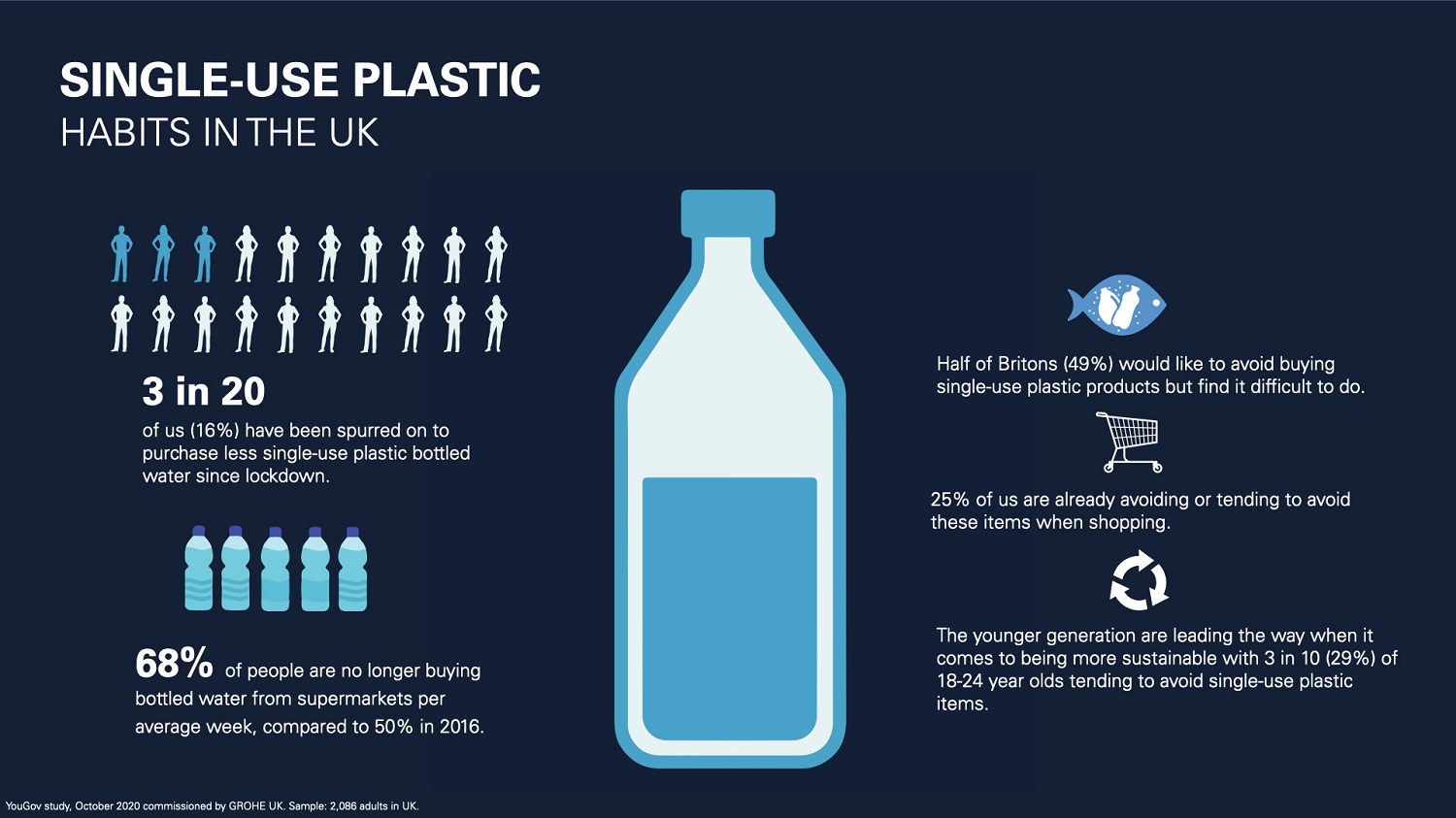
The research shows that almost half of Brits (49%) are now keen to avoid single-use plastic products but find it difficult to do so. However, 25% are already ahead of the rat race and savvy to the plethora of options available, and already successfully avoiding or tending to avoid these items when shopping.
Those paving the way for a more sustainable future are aged 18-24 with a third (33%) already actively avoiding single-use items where possible.
Whilst many are seeking more sustainable alternatives to single-used plastic bottles such as filtration systems and refillable water bottles, 5% of the population confess to buying ten or more bottles of water per average week.
A caffeine-fuelled nation
Few would dispute Brits’ love of tea and coffee. This year, with more time than ever spent at home and self-care top of the agenda, it’s not surprising that almost 3 in 10 of us (29%) have increased our daily intake of tea or coffee since the initial lockdown period. Those who reached for a mug the most were aged 18-24 (38% increase) whilst a third (36%) of full-time students consumed additional tea or coffee. Meanwhile, those living in the East of England saw the biggest increase of 37%.
Whilst “making a brew“ has long been the nation’s go-to solution for solving a problem, our affections for a steaming hot mug of tea or coffee may well have been underestimated. The study reveals that tea and coffee fulfill a vital role when it comes to taking care of our wellbeing. As many as 55% of us who drink tea or coffee use our favourite hot beverage as a means of emotional soothing; whether it is to relax, de-stress, boost mood or provide a quick pick-me-up when upset.
Aside from supporting our mental wellbeing, the study reports that coffee and tea are deeply rooted parts of our daily routine – something we have all needed to maintain throughout this year – with 31% of us who drink coffee or tea heading to the kitchen to make a hot drink as a way to take a break from work. Similarly, a further 30% also admit to turning to coffee and tea to help them feel energised, a sure-fire way to aide productivity during theselong months of working from home.
Whilst our affinity for our favourite caffeine fix corresponded with certain behaviours across the nation, there are two key demographics that saw a more significant impact. In the North East, 27% – more than a quarter – used their favourite hot drink to de-stress, the highest figure across all regions in the UK. Meanwhile, student populations are also reaping the wellness benefits with 41% of full-time students saying that they drink tea or coffee to help boost their mood, compared to the national average of just 22%. Interestingly, 14% of students also reported using tea or coffee (which may also include herbal-based drinks) as an aide to help them sleep, a significantly higher percentage than the national average of just 5%.
Who is drinking the most tea and coffee in the UK?
For those who drink tea or coffee, lattes (10%) and americanos (13%) were confirmed as firm favourites however it was the traditional English Breakfast tea (32%) which took the top spot as the nation’s favourite hot drink. Those living in Wales were the biggest fans of the “builders brew“, 42% named it their hot drink of choice.
Given that Brits feel tea and coffee are a key fixture in our everyday lives, helping our mood and keeping us productive, it’s no surprise that 73% of us are drinking 3 cups or more each day. However, for some, our caffeine consumption is actually much more. The biggest caffeine drinkers are aged 55+, with half (49%) confessing to drinking 5 – 6 cups or more of tea or coffee each day.
The below graphic highlights which regions have the UK’s biggest tea and coffee drinkers (those drinking 5-6 cups or more per day) – the North East (45%) and Wales (44%). By contrast, the graphic also highlights that London is the region with the lowest consumption at just 26%.
What are the solutions?
Enjoying a hot drink provides many of us with a quiet moment to reflect and take a step back. The GROHE Red, a kettle hot water tap delivers filtered water of temperatures up to 99 degrees Celsius so you can enjoy that extra moment of time saved not having to boil the kettle and an even more delicious cup of tea or coffee, free from any lasting taste of limescale and with no concerns about the water you’re drinking. 59% of us are already saving and reusing the excess water in our kettles for next time but with a hot water tap, you take fresh, pure filtered water each time.
For those wanting to improve the taste of their tap water, or choose a life-long solution that will help them reduce their contribution to the plastic crisis, GROHE’s Blue range provides a sustainable choice. The Blue Pure offers the most cost-effective solution. Homeowners can simply replace their current tap with the Pure model which offers both filtered and standard hot and cold water and install the compact filter beneath their sink. Its Eurosmart model has also received the prestigious Good Housekeeping Approved accreditation for innovative design and intuitive use.
Many of us enjoy our water with a bit of fizz and consequently have to resort, again to buying bottles of sparkling water. However, GROHE’s Blue Home system delivers filtered and chilled water in still, semi-sparkling and sparkling options and completely eradicates the need for purchasing single-use plastic bottled water. Whilst the initial investment of a system will appear much more than your weekly spend on bottled water, the GROHE Blue Home system can be repaid in an average of just 20 months.
Following this, the GROHE Blue Home can go on to make savings of approximately 58 pence per litre compared to the cost fo leading bottled water brands, ammounting to savings of £1,000 per year.
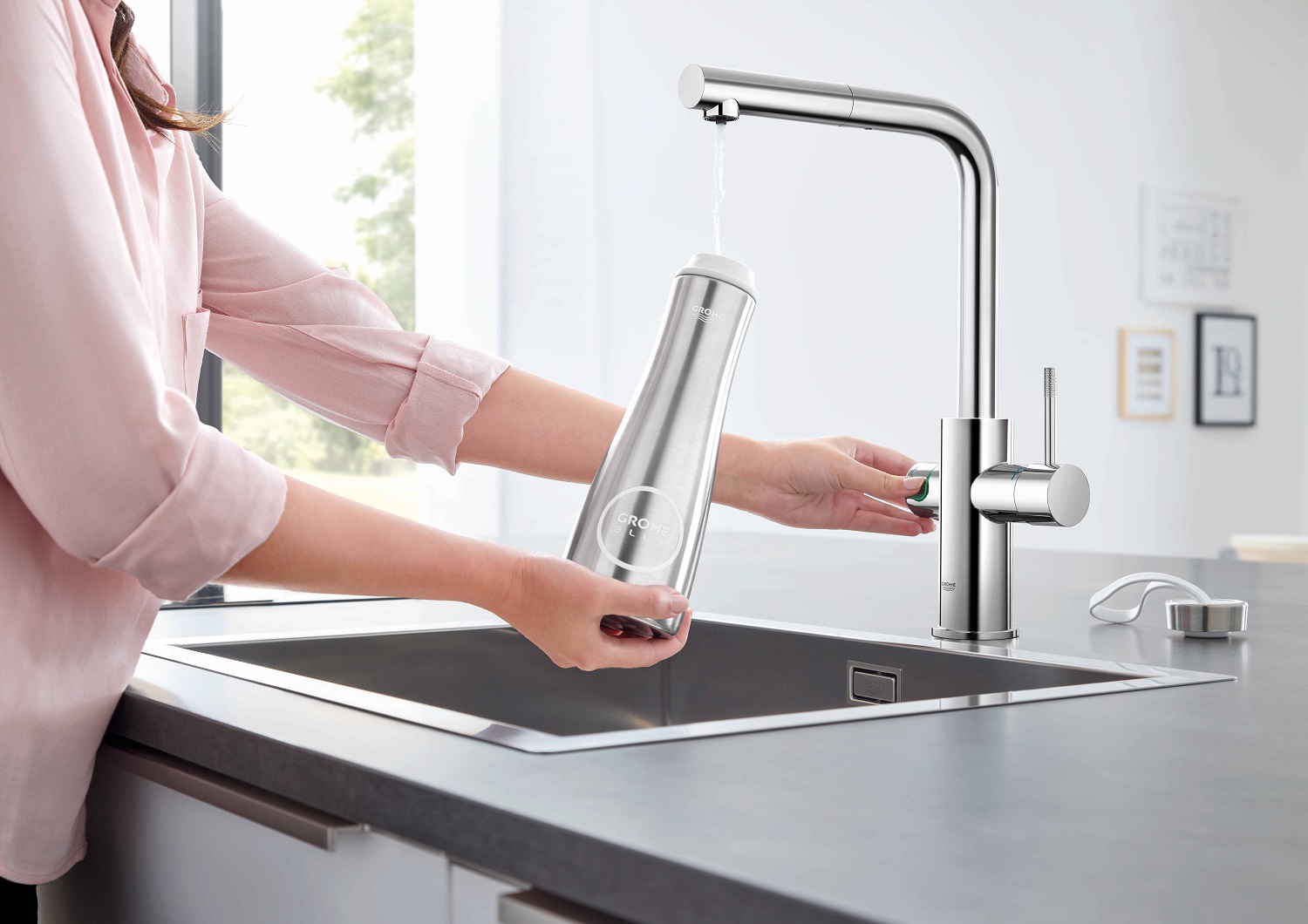
For a limited time only, GROHE is offering a cashback reward of up to £75 and a free gift across 39 different models from its GROHE Red and Blue tap ranges when purchased from an eligible retailer.
Customers who purchase a GROHE Red will receive a GROHE Red thermo flask with tea strainer; those purchasing the GROHE Blue Pure or Blue Home will receive a GROHE Blue water bottle, whilst those purchasing the GROHE Blue Professional will receive a GROHE Blue carafe with six glasses, perfect for kitting out a larger household or office kitchen, in preparation for a hopeful return to the office workplace in 2021. The promotion runs until 31st January 2021 with all cashback claims to be made by 28th February 2021.
More news from GROHE
